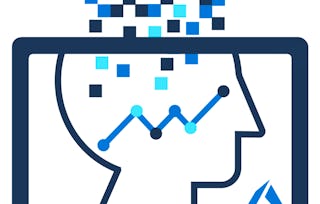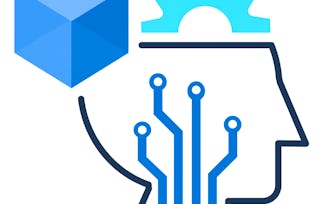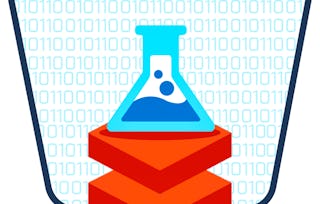Machine learning is at the core of artificial intelligence, and many modern applications and services depend on predictive machine learning models. Training a machine learning model is an iterative process that requires time and compute resources. Automated machine learning can help make it easier. In this course, you will learn how to use Azure Machine Learning to create and publish models without writing code.

Microsoft Azure Machine Learning for Data Scientists

Microsoft Azure Machine Learning for Data Scientists
This course is part of Microsoft Azure Data Scientist Associate (DP-100) Exam Prep Professional Certificate

Instructor: Microsoft
16,498 already enrolled
Included with
178 reviews
Recommended experience
What you'll learn
Identify different kinds of machine learning models
How to use the automated machine learning capability of Azure Machine Learning to train and deploy a predictive model
Create regression, classification, and clustering models using Azure Machine Learning designer
Use Azure Machine Learning to create and publish models without writing code
Skills you'll gain
- Databricks
- Model Deployment
- Artificial Intelligence and Machine Learning (AI/ML)
- Data Pipelines
- Virtual Machines
- Classification Algorithms
- Model Evaluation
- Applied Machine Learning
- Machine Learning
- Scikit Learn (Machine Learning Library)
- Regression Analysis
- Predictive Modeling
- Unsupervised Learning
- MLOps (Machine Learning Operations)
- Responsible AI
- Supervised Learning
- Microsoft Azure
- Skills section collapsed. Showing 8 of 17 skills.
Details to know

Add to your LinkedIn profile
12 assignments
See how employees at top companies are mastering in-demand skills

Build your Machine Learning expertise
- Learn new concepts from industry experts
- Gain a foundational understanding of a subject or tool
- Develop job-relevant skills with hands-on projects
- Earn a shareable career certificate from Microsoft

There are 4 modules in this course
Training a machine learning model is an iterative process that requires time and compute resources. Automated machine learning can help make it easier. In this module, you'll learn how to identify different kinds of machine learning model and how to use the automated machine learning capability of Azure Machine Learning to train and deploy a predictive model.
What's included
3 videos8 readings3 assignments1 discussion prompt1 plugin
Regression is a supervised machine learning technique used to predict numeric values. In this module, you will learn how to create regression models using Azure Machine Learning designer.
What's included
2 videos8 readings3 assignments
Classification is a supervised machine learning technique used to predict categories or classes. In this module, you will learn how to create classification models using Azure Machine Learning designer.
What's included
2 videos8 readings3 assignments
Clustering is an unsupervised machine learning technique used to group similar entities based on their features. In this module, you will learn how to create clustering models using Azure Machine Learning designer.
What's included
3 videos9 readings3 assignments1 discussion prompt
Earn a career certificate
Add this credential to your LinkedIn profile, resume, or CV. Share it on social media and in your performance review.
Explore more from Machine Learning
Why people choose Coursera for their career

Felipe M.

Jennifer J.

Larry W.

Chaitanya A.
Learner reviews
- 5 stars
60.11%
- 4 stars
23.03%
- 3 stars
10.11%
- 2 stars
1.12%
- 1 star
5.61%
Showing 3 of 178
Reviewed on Jan 3, 2024
Some exercises had outdated instructions, considering the recent updates in Azure Machine Learning services.
Reviewed on Feb 13, 2024
very easy to follow module...I love the hands-on practice with the Microsoft Azure Platform as well
Reviewed on Jan 14, 2023
Great content with very helpful practical exercises

Open new doors with Coursera Plus
Unlimited access to 10,000+ world-class courses, hands-on projects, and job-ready certificate programs - all included in your subscription
Advance your career with an online degree
Earn a degree from world-class universities - 100% online
Join over 3,400 global companies that choose Coursera for Business
Upskill your employees to excel in the digital economy
Frequently asked questions
IT professionals interested in learning about the types of solutions artificial intelligence (AI) makes possible, and the services on Microsoft Azure that you can use to create them.
Working IT professionals looking for additional skills or credentials to demonstrate knowledge of common ML and AI workloads and how to implement them on Azure. IT professionals looking to specialize in the specific area of Artificial intelligence on Azure.
Machine learning is at the core of artificial intelligence, and many modern applications and services depend on predictive machine learning models. Training a machine learning model is an iterative process that requires time and compute resources. Automated machine learning can help make it easier. In this course, you will learn how to use Azure Machine Learning to create and publish models without writing code.
You should expect to spend at least an hour every week for four weeks to complete all aspects of this course.
More questions
Financial aid available,





